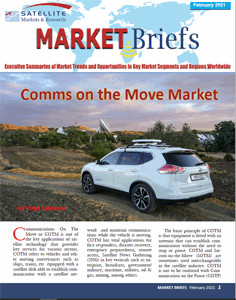Satellite Markets and Research Editor-in-Chief Virgil Labrador spoke with Maxim Usatov, Chief Technical Officer (CTO) and Founder of BusinessCom, a satellite solutions provider at the forefront of innovative solutions for VSAT and Comms On The Move (COTM) services. Excerpts of the interivew:
 |
| Maxim Usatov |
What are the key services that your company provides?
Since 2003 we have been dedicated to providing high-performance satellite services and solutions to enterprise clients. We see ourselves as a satellite solution provider. We leverage our technical expertise in various IT fields to deliver complex solutions to our business clients and partners worldwide. We offer a wide range of VSAT services for a variety of markets, such as SME, oil and gas, utilities, mining, defense and government, education, and others. We have a strong portfolio of SCPC and TDMA services on both geostationary and inclined orbit satellites for cellular backhaul and IP trunking for national and regional ISPs, offering exceptional value and consistent high quality of service. BusinessCom operates in Ku, Ka and C frequency bands—the latter, we recognize, as being critical to delivering reliable service in tropical climate zones. Another direction we are active at is mobile connectivity including traditional gyro-stabilized maritime solutions and, recently, communications-on-the-move (COTM) systems based on electronically steered flat panel antennas (FPA).
What would you say are the unique differentiators between you and the other service providers?
The nature of our customers demands that we underline quality of experience as the most important factor in our work. There are several components in our business that make BusinessCom stand out. First is the way we manage our satellite networks. We work with each client to make sure they buy enough CIR and MIR bandwidth to satisfy their traffic requirements. Each remote is pre-qualified on sales engineering stage before joining the network. This allows BusinessCom to deliver consistent quality of service on a long-term basis to all the subscribers while generating enough revenue to continue upgrading our capacity pools as we grow. As a result, we have clients who have used our services for well over a decade. We believe our churn rate is lower than many other service providers.
In 2016 we introduced our Portal – a business and operations support system. This platform, popular with our clients and partners, is continually being developed and updated to provide new features and capabilities for our internal administration as well as adding new features requested by clients and partners. We use Portal to converge multiple VSAT platforms on different satellites and teleport networks with the goal of delivering a unified managed service offer. The Portal aggregates all the operations data and statistics from different VSAT platforms and remotes into a single integrated platform where we and our clients and partners can make educated decisions regarding bandwidth allocation, service management and future procurement.
Another technology we actively rely on is our Sentinel – a server based on the open source FreeBSD operating system, designed by BusinessCom for remote VSAT management. We delivered the first model in 2013 and it has proven to be a highly successful product, currently on its fourth revision. A Sentinel at a remote site is almost like having an IT technician at the site. Most remote problems end up being data related, rather than satellite related. The modems from vendors such as iDirect do a good job on the satellite side but come up short when it comes to diagnosing data-related problems. An extensive set of diagnostic and troubleshooting tools makes it possible to identify traffic issues and then leverage full-featured bandwidth management controls to ensure that the client’s bandwidth is optimized to their requirements. Sentinel also provides VPN, firewall, network instruction detection, monitoring and other advanced networking services, such as caching, user authentication, fail-over and load balancing—at the remote end. The Sentinel, effectively, is a computing platform that allows us to deploy advanced networking services at the remote sites, secure them, custom-tailor our solutions to satisfy particular business application requirements and integrate seamlessly into existing local networks.
In addition, BusinessCom offers a wide selection of telecommunications and IT services, such as our threat management platform called SecureLink, SD-WAN and terrestrial MPLS-enabled backhauls, and WAN optimization solutions.
What unique benefits and advantages does your services provide to your clients?
We have a unique portfolio of satellite services that deliver exceptional value to our clients and partners. We can start with our access to exclusive satellite capacity and uplinking capabilities in Europe, USA and elsewhere. We have invest significant resources in service management. For example, for our shared bandwidth services, like iDirect Broadband, we have developed a unique automatic methodology for monitoring our TDM/TDMA pools and overall network health. This allows our NOC to exercise proactive network management ensuring that the quality of burst delivered to each remote site remains consistent, and that the SLA terms are met throughout the whole contract term. With Portal, our partners and clients also have the ability to manage and monitor all their satellite links and contracts from a single web interface. This is quite convenient if you are an organization with, say, many tens or hundreds of remote sites.
Our Sentinel-enabled VSAT remotes are “smarter” than basic satellite IP routers. Sentinel and SecureLink help keep our networks effectively free of malware. This helps to reduce wasted satellite capacity, network downtime and remote maintenance costs. Business clients deploying office branches may want to have the ability, for example, to authenticate end users in their LANs to avoid bandwidth abuse, or implement automatic switch-over or even load balancing between the VSAT link and a terrestrial connection like LTE – something we also support by default.
Unlike traditional service providers, our NOC has significantly extended its remote monitoring capabilities and troubleshooting jurisdictions, often going into the remote’s LAN, if the user permits, and addressing many issues at their source. The bandwidth is also managed locally. In other words, instead of providing bandwidth on a per-remote basis, our clients can elect to have their bandwidth delivered on a per-host basis, with unique QoS policies defined at the remote end per each user connected and authenticated in the LAN.
It is a little challenging to describe all the technological advantages we deliver in a brief interview, as we have spent more than a decade developing all those capabilities. In short, we see ourselves as a complex solution provider. We like to delve deep into customer connectivity problems and offer solutions that work. We have a team with in-depth technical knowledge of all the key VSAT platforms available on the market, Unix-like operating systems and IP networking, microwave and other terrestrial connectivity media—and they’re backed by a strong global operations unit to provide logistics and on-site support. Our sales engineers go the extra mile to understand the customer’s connectivity requirements from multiple perspectives, deliver an efficient, uncompromising solution and work with the NOC to provide effective support service. The turn-key systems we offer often consist of the satellite terminal, service, and an array of other components. The quality of user experience is put first.
What are the most recent innovative solutions in the Comms on the Move market that your provide?
BusinessCom has adapted its capabilities with the goal of delivering the most high-performance COTM service available on the market today.
| To read or download a pdf of the full report on the Comms On The Move (COTM) Market sponsored by BusinessCom click here. |
We have paused and asked ourselves—can on-the-move services offer enterprise-grade reliability with unlimited data? We asked oursleves what had to be done to make this happen. I believe we have achieved this quite successfully. Unlike our competitors offering best-effort connectivity with data caps, BusinessCom offers its COTM service with fully unlimited bandwidth and an enterprise-grade SLA. At our price point we believe we are delivering exceptional value to users seeking for on-the-move connectivity for intensive use, such as high-definition streaming and high-volume data transfers. For many user applications our unlimited COTM service, billed at a flat monthly fee, provides typically 2-3 times better OpEx than other services billed on a per-GB (or per-MB) basis, and the users don’t have to worry about reaching hard data caps. The solution is especially effective if you consider a fleet of vehicles or sea vessels sharing the same bandwidth pool, offering unprecedented capability, at the cost lower than competition.
Our COTM service is based on the same hub infrastructure as our other iDirect-enabled services, providing all the features of the Portal, Sentinel, SecureLink, and all the other value-add we provide to clients on parabolic reflectors. From a user experience, a COTM remote is very similar to a fixed or a Communications-on-the-Pause (COTP) remote, except that it stays online in motion. As many types of remotes converge to the same platform, our customers can have a single pool of bandwidth serving a wide range of assets – from fixed headquarters, branch offices, to mobile COTM and COTP remotes, and maritime vessels on both gyro-stabilized and flat panel antennas.
What can we expect from BusinessCom Networks in 2021?
As an authorized Kymeta partner, we are going to explore our COTM capabilities further: we plan to extend our wide-beam Ku-band COTM coverage this year to accommodate users from Africa and the Americas. We also stand vigilant vis-à-vis recent pricing trends on GEO satellites: as capacity prices continue their descent globally, we hope to offer even faster satellite services at lower price points. I see this as a positive for the satellite broadband industry overall: businesses and organizations require increased throughput to support ever-growing data volumes and high-definition streaming. The last couple of years I have suggested that VSAT risks becoming a dinosaur—while terrestrial services are now sold in hundreds of Megabits or even Gigabits, the VSAT industry is still largely counting kilobits! According to the latest Cisco report, the average global terrestrial broadband speeds are expected to exceed 100 Mbps within a couple of years, so it is promising to see the satellite industry finally catching up. BusinessCom offers 50 Mbps packages on some of the broadband beams we have in the Middle East and sub-Saharan Africa already, and we are working to expand this capability to other regions, and increase the speeds even further.






